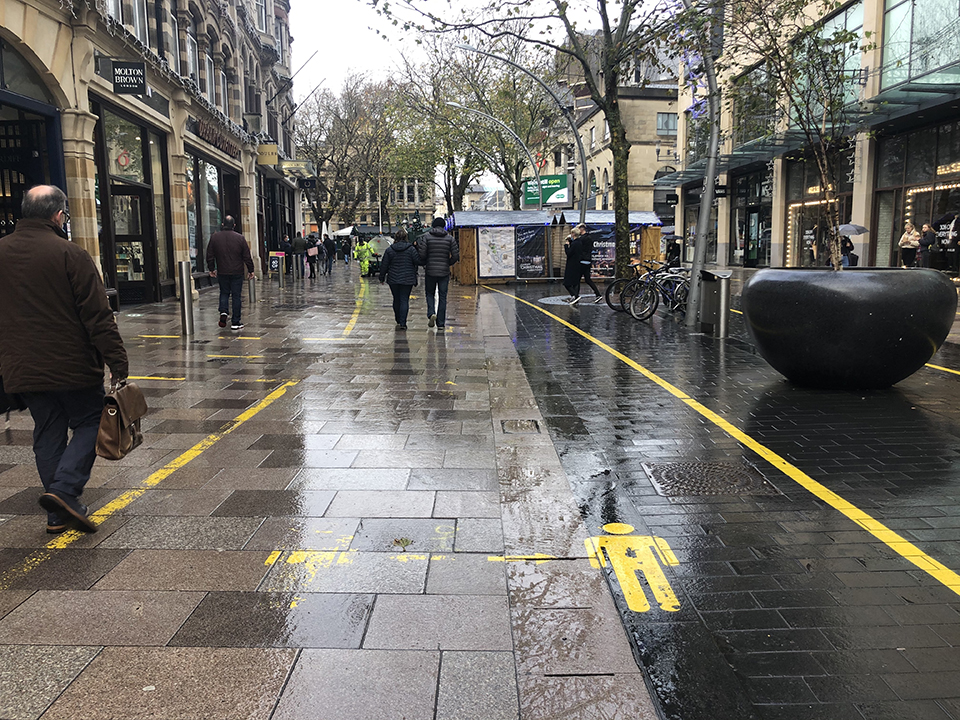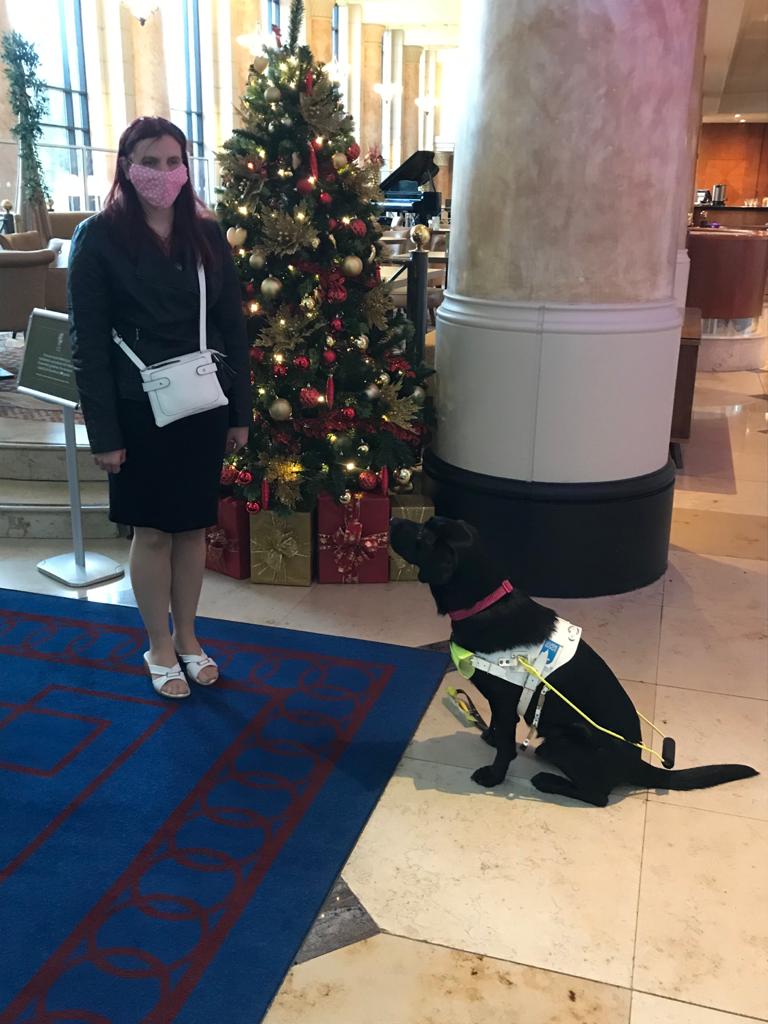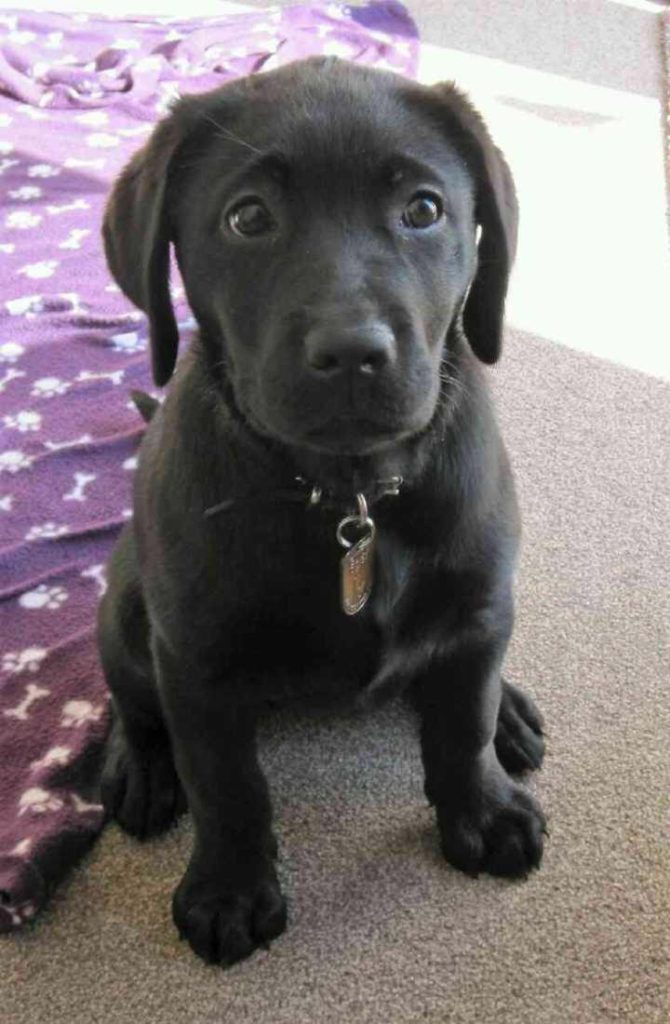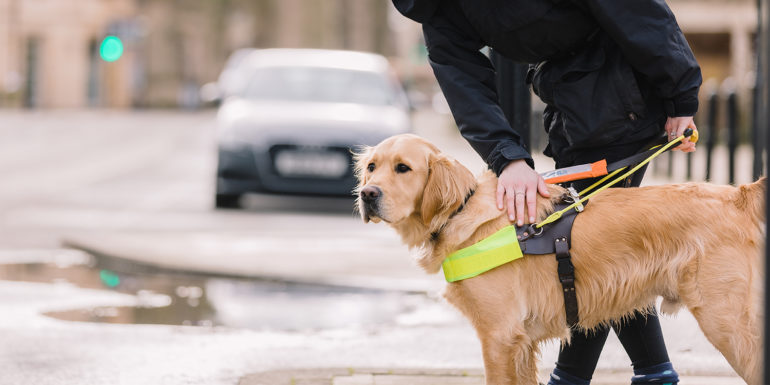Covid-19 safety measures such as lockdown, social distancing and one-way systems have had ‘huge impact’ on people with sight loss
THE ‘new normal’ has forced us all to make changes to the way we live but for the blind and partially sighted these adaptations have raised significant problems.
One-way systems, social distancing markers and changes to Cardiff’s public spaces have made the city an even more challenging environment for those with sight loss.
“Judging proximity and distance is often very difficult for someone with sight loss and of course guide dogs cannot be trained to socially distance,” said Ansley Workman, director for Royal National Institute of Blind People (RNIB) Cymru.
The key concerns are temporary changes to urban environments such as different entrances and exits to shops. People with sight loss often memorise routes, so these changes make the city difficult to navigate.
Ms Workman added that many of the changes to streets and city centres “disproportionately affect people with sight loss” and “were made without consideration of the potential impact they would have on people with disabilities”.
Such changes have led many blind and partially sighted people to feel less confident about leaving their homes, with some becoming isolated or dependent on others.
“Social isolation has caused me to lose confidence in my independence, which has really set me back,” said Shiela Kinch, 65, of Ely.
“I am scared to go out because I have no idea if I am two metres apart from people and I can’t use touch to navigate and steady myself”.

The impact on guide dogs
The pandemic has also meant unavoidable delays in getting help to those in need.
Andrea Salt, 28, had already been waiting a year prior to the pandemic for a guide dog, after her previous dog, Edie, died unexpectedly from an aggressive form of cancer.
However, the pandemic meant that Guide Dog training centres had to close and the complex process of matching dogs with owners had to be paused.
As a key worker, Ms Salt had to adjust to using a cane and relying on taxis to continue working and navigating the city.
“People are really helpful, everyone is so friendly but with a cane that can sometimes be a hinderance because I need to walk into things to know where they are,” said Ms Salt.
It was not until October that Ms Salt was paired with her new dog Cassie, a two-year-old black Labrador.

Cassie and Andrea. Credit: Andrea Salt 
Cassie at the start of her training. Credit: Deborah Rees
Although it is early on in their partnership, Cassie is already helping Ms Salt stay safe.
“I am so lucky to have a guide dog now – she is really helping me keep safe during the pandemic. I don’t have to touch many things or take as many people’s arms to be guided,” said Ms Salt.
“The dogs give you your life back without having to depend on other people.
“She [Cassie] helps me get from A to B safely and quickly, fills me with so much more confidence and helps me go out and achieve things. She’s amazing”.
Andrea Gordon, external affairs manager for Guide Dogs Cymru, explained the difficulties the charity faced during the pandemic.
“With the help of video lessons from our expert staff, several volunteers took up the challenge of training dogs from their living rooms and gardens,” said Ms Gordon.
She continued: “Many people are under the impression that it is easy to replace one dog with another, but the matching process can be difficult and complex. It is vital that we match a person with the right dog if the partnership is to succeed”.
What is being done to adapt to Covid?
To overcome these Covid-related difficulties, both RNIB Cymru and Guide Dogs Cymru have altered how they offer support during the pandemic.
Many in-person services offered had to be moved online or over the phone.
From the start of lockdown, Guide Dogs Cymru staff have made nearly 1,000 calls to check on the welfare of those using their services or on their waiting list.
Ms Gordon said: “In Wales, people with sight loss were not automatically given access to online deliveries from supermarkets, so many people asked for advice on accessing food and medicine”.
The charity provided regular phone contact when required, and provided additional information and guidance through a Covid sight loss information line and their website.
The advice included tips on wellbeing, as well as practical advice for everyday living during the pandemic.
Meanwhile, the RNIB has been working to raise awareness of the difficulties those with sight loss face when it comes to social distancing.
In October, they launched a range of wearable social distancing markers for people with hidden disabilities.
The markers are designed to give the wearer more confidence when out and about, and to let people around them know they may struggle to adhere to social distancing.
“Social distancing has proved to be a tremendous challenge for blind and partially sighted people,” said Ms Workman.
She added: “Not all disabilities are visible and it might not be obvious that someone is struggling to social distance, so please be kind and give people a little extra space”.
For help and support for blind and partially sighted people, their family and their carers, contact:
- RNBI on 0303 123 9999 or helpline@rnib.org.uk
- Guide Dogs on 0800 781 1444 or see their website for more information



